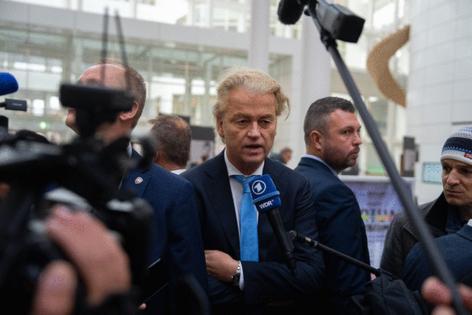Dutch far-right leader's bid for more power risks flopping
Published in News & Features
Geert Wilders is betting that triggering the collapse of an unloved Dutch government will position him to emerge stronger and become the nation’s dominant political figure, but signs are emerging that the far-right leader’s gambit could backfire.
By alienating potential coalition partners and testing the patience of weary voters, Wilders is losing support compared to the last election and his Freedom Party’s lead over the GreenLeft–Labour alliance has narrowed.
While Wilders still has months to campaign ahead of the Oct. 29 election and is skillful at commanding the spotlight in the Netherlands’ fragmented political landscape, his core topic of migration is now contending with new challenges sparked by frayed transatlantic relations under U.S. President Donald Trump — an ally of the far-right leader.
That makes the pending Dutch snap election an important test of how deep anti-immigration populism runs as Europe seeks to rally together to contend with trade disputes with the U.S. and military threats from Russia.
Immigration continues to be the second-most important issue for voters after housing, according to the June Ipsos I&O poll with 38% saying politicians should prioritize it. But defense is catching up with 23%.
“Given the geopolitical context — the Trump agenda — it could add up that voters becoming fed up with unpredictable nationalists,” said Stefan Couperus, an associate professor of political science at Groningen University. “This could take away some of Wilders’ constituency.”
The far-right firebrand risks a repeat of 2012, when the Freedom Party refused to support austerity measures leading to the collapse of Mark Rutte’s first government. The ploy failed and his party lost seats in the subsequent election.
Even without Rutte in the way to forge a consensus, the same thing could happen this time. Although Prime Minister Dick Schoof’s administration was ineffective, Wilders led the biggest ruling party and will struggle to avoid blame for its failure to get much done.
“Arguing, disagreement, stagnation is what the Cabinet has offered this country,” said Frans Timmermans, the former European commissioner who heads the GreenLeft-Labour alliance, speaking in parliament this week. “When it comes to taking responsibility and making difficult decisions, Wilders does not deliver.”
Disappointment is particularly pronounced among people who voted for the Freedom Party in the last election. Their approval of the government’s performance more than halved to just 13%, according to the survey of more than 16,000 people by TV news program EenVandaag. In the Netherlands’ fickle political landscape, that means these voters could switch allegiance or give in to apathy.
As in previous ballots, it’s expected that more than a dozen parties will be vying for parliamentary seats. Those conditions stem from the lack of minimum thresholds and have forced Dutch politicians into coalitions, which typically take months to form.
Rutte — the longest serving premier in Dutch history — was adept at forging deals across party lines, but after his four-party alliance collapsed in 2023 over an immigration dispute, he left national politics. That weakened his center-right People’s Party and opened a power vacuum that Wilders is trying to fill.
Despite the Freedom Party being the biggest after the November 2023 election, Wilders was forced to give up the premier post because prospective partners balked. Schoof, a nonpartisan civil servant, was given the job, leaving the setup less stable.
“Next time, I’ll really become prime minister myself,” Wilders said in a social media post last month.
Although positions can quickly change when power is at stake, his list of potential partners could be limited after he pulled the Freedom Party out of the ruling coalition over a migration dispute.
Henri Bontenbal, head of the Christian Democratic Appeal — which has posted the biggest gains in the polls — rejected collaborating, saying “Wilders’ party does not care about democracy.” The center-right NSC also said no, although its support collapsed after founder Pieter Omtzigt quit politics.
“He has managed to accomplish nothing,” said Rob Jetten, leader of the progressive Democrats 66 party in parliament. “You have shown yourself to be a very cowardly leader,” he said to Wilders during a parliamentary debate.
Dilan Yesilgoz-Zegerius, the new head of the People’s Party, bucked the trend and left the door open, saying she needs to “make up her mind.”
If Wilders does stumble again, it will highlight how joining government can present anti-establishment figures with an identity crisis. Like other nationalist politicians, he casts himself as an outsider, but that reputation gets undermined by the compromise needed to implement policy.
Other right-wing movements have been more flexible. France’s National Rally has moderated its tone as it gets closer to power. In Italy, Prime Minister Giorgia Meloni has toned down her rhetoric to maintain popularity, but Matteo Salvini’s League party — her right-wing ruling partner — has struggled to adapt to its role in government.
“What you now see happening in France and with the Meloni government is they are trying to normalize themselves further,” said Groningen University’s Couperus. “That can only be done if they make a genuine effort to come to terms with stances that are more centrist. Something Wilders refuses to do.”
(Sarah Jacob and Donato Paolo Mancini contributed.)
©2025 Bloomberg L.P. Visit bloomberg.com. Distributed by Tribune Content Agency, LLC.







Comments